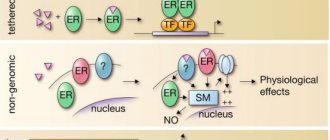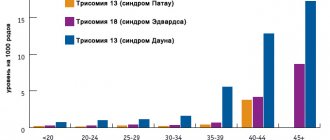Life after abortion
We asked Maria Bloch, a perinatal psychologist, sexologist, and psychotherapist, about the psychological consequences of abortion and why it is important to promptly seek help from a professional psychologist.
Maria Evgenievna, I would like to touch upon a very difficult topic - the topic of abortion, or rather its consequences. They usually talk about medical consequences and rarely about psychological ones. Nevertheless, in psychology there is even a special term - “post-abortion syndrome.” What is it and how does it manifest itself?
The term “post-abortion syndrome” is used to describe psychological problems, mental and psychosomatic disorders that appear as a result of an abortion. These manifestations can occur either immediately or several years after the abortion. Post-abortion syndrome has a long-term course, and relapses are possible.
The expression “post-abortion syndrome” was first used in 1981 by family psychotherapist Vincent Roux. But so far this term has not been included in the international classifications of diseases or mental disorders, which, apparently, is due to the ambiguous attitude towards abortion in different countries. For example, in countries such as Afghanistan, Angola, Egypt, Indonesia, Iraq, Iran, Ireland, Chile, abortion is considered murder and is completely prohibited. In some countries, for example Argentina, Brazil, Israel, Mexico, Poland, Spain, abortion is possible only for medical reasons and in exceptional cases. For medical and socio-economic reasons, abortion is legal in England, India, Iceland, Luxembourg, Finland, and Japan. And a fairly large number of countries, including our country, allow the freedom to choose whether or not to continue pregnancy in its early stages.
Post-abortion syndrome can manifest itself in different ways. A woman may experience feelings of guilt, fear of retribution, and sometimes a desire to be punished. These can be depressive and anxiety states, expressed, for example, in the form of somatic sleep and eating disorders, headaches and heart pain, etc. Some women experience the abortion situation over and over again, resulting in recurring and intrusive memories or nightmares about the abortion or the unborn child. Women often experience emotional isolation from events associated with this trauma - in partnerships, interactions with children.
Why does abortion have such serious psychological consequences?
During pregnancy, a woman’s body changes, hormonal changes occur, and an emotional dyadic mother-child bond is formed. Interruption of this process is stressful for the body, experienced as a threat to health and life. In addition, regardless of the reasons for which an abortion was performed, a sense of loss is consciously or unconsciously experienced. There is a saying: “When a parent dies, you lose your past. When a child dies, you lose your future.” In a situation of abortion, there is not only a physical loss, but also a symbolic one - this is the loss of an object of attachment, the status of a parent, a future, a part of oneself, often meaning and self-respect.
Do all women experience this syndrome after an abortion?
Experiences associated with the situation of abortion are always present, but their degree of severity and the time of their appearance may vary. This is due to many reasons that are individually significant for each woman. It is believed that risk factors for the development of post-abortion syndrome are conflicting maternal feelings, for example, when the pregnancy was desired, and the woman decides to have an abortion due to circumstances (identified fetal malformations, reluctance now to have a child on the part of the partner or other close people, unfinished studies, prospects for work, etc.); The longer the pregnancy, the more difficult it is to make the decision to have an abortion, and the more pronounced the negative consequences. Some psychological characteristics of a woman also increase the risk of developing post-abortion syndrome: a tendency to self-flagellation, low self-esteem, traumatic situations and experiences in the past. Risk factors also include lack of support at the stage of reproductive choice.
Could similar effects occur in men? Or do they experience the abortion situation in some other way?
For men, the depth of experience of abortion is also associated with various circumstances, primarily with the significance of parenthood, family and marital relationships, as well as with the peculiarities of his ideas about himself as the father of a child. In everyday life, there is an opinion that men are more callous and unemotional, but this is not entirely true. It is more difficult for a man to express his feelings, first of all, this is what society teaches: “Men don’t cry...”. However, even statistics show that more than two thirds of men subsequently regret the decision to abort their child and feel guilty.
Is it true that abortion affects not only parents, but also the children born? Please tell us more about this.
If a woman develops post-abortion syndrome, she unconsciously isolates herself from everything that reminds her of her pain, and this, first of all, is children. Feelings of guilt, an unconscious desire to regain what was lost, and fear of loss can provoke either coldness and alienation, or, conversely, alarming overprotection, in which the mother’s care is so insatiable that it borders on aggressiveness.
The child may develop survivor syndrome: knowing that his mother killed his brother or sister, the child may feel guilty, thinking that he lives because others died in his place. The relationship between such children and parents is fickle and uncertain. Fear for one's existence, feelings of guilt and inferiority, distrust of the mother and isolation appear. Because these children find it difficult to trust their parents, they cannot trust themselves. They are afraid of future parental responsibilities.
Is it possible, having recognized the signs of post-abortion syndrome in oneself, to cope with it on one’s own, without the help of a psychologist? How to do it?
First of all, it is necessary to acknowledge what happened. In the situation of experiencing an abortion, the first and strongest psychological defense is denial, avoiding the problem, which can provoke abuse of alcohol or drugs to forget, excessive activity, anger and guilt at others, replacing one’s own feelings of guilt, or replacing the trauma with the next pregnancy. Moreover, any attempt to justify the abortion by circumstances or to smooth out the pain only increases the dire consequences for the woman. Therefore, only by agreeing with her responsibility and accepting her feelings can a woman gain the strength to move on. Recognizing the truth makes a person stronger and makes it possible to move into a new quality of life. This will help the woman mourn her lost child. It is very important to end relationships with lost children, accept their fate, and most importantly, give each child a place in your heart. And of course, you need to try to forgive others. This is also difficult, but necessary in order to complete the loss and get rid of long-suppressed rage. It is very important for partners to understand that after an abortion their relationship will no longer be the same. Partners are separated from each other by disappointment, resentment and loss of trust in a couple. It is important for a man to give a woman the opportunity to grieve. Respect for this process unites the couple and gives strength to both. At every stage, compassion, support and understanding from one or more people close to the woman are vital.
Can post-abortion syndrome not detected in time lead to more severe illnesses - depression or other mental disorders?
Any unresolved problem can lead to mental disorders, including psychosomatic diseases. This is why it is so important to seek help on time. One study compared the mental health of women who ended their pregnancies through abortion with those who lost a child through miscarriage. Women who have lost a child through miscarriage have been found to experience more psychological problems in the first 10 months after the miscarriage. At the same time, women who have had an abortion have fewer psychological problems in the first 10 months, but subsequently (after 2 years) they are significantly more likely to have high scores on depression and anxiety scales.
Do women often turn to a psychologist to cope with their feelings after an abortion?
Unfortunately, most women do not turn to a psychologist in the situation of experiencing an abortion. This is due, first of all, to denial: the unplanned pregnancy itself puts a woman in a stressful state from which she wants to close herself off, forget and not remember her pain. In addition, women often do not realize the seriousness of possible problems; many who suffer from the consequences of abortion regret that they did not have reliable information.
According to statistics, 90% of couples who have had abortions in their relationship history break up. What is this connected with?
Probably, the figure of 90% is still overestimated, however, such statistics actually exist. A feeling of deep inner emptiness, an inferiority complex, aggressiveness, and hostility towards men and her husband also play a role. Femininity can turn into coldness. For a woman, this man is “not a father”; he did not take responsibility for her and the child, supported an abortion, or even advised it. For a man, this woman is “not a mother”; she killed his child. Suppressed resentment towards a partner does not allow spouses to start a conversation, accept their feelings and the feelings of the other, or mourn the loss together.
Can you remember a particularly memorable moment or episode from your work related to the topic of abortion?
Each patient is unique and each story is tragic in its own way. It is very difficult for a family when the birth of a child is associated with the transference of their unresolved problems onto him. For example, in a situation where a woman is trying to cope with her feelings of guilt and grief of loss due to a previous abortion by planning subsequent pregnancies. I remember a patient I worked with many years ago for severe toxicosis of pregnancy, when pregnancy turned into an ordeal for her. She could not eat, was losing weight, suffered from uncontrollable vomiting, and medications had difficulty easing her condition. This woman had a history of several abortions and, having gotten married, decided that she should give birth to as many children as she had abortions, and she should bear and give birth to them in agony, punishing herself. This attitude prevented her from enjoying motherhood and building adequate parent-child relationships. Therefore, not only she suffered, but also her children. Only after working through her pain, letting go of her unborn children, mourning them, was she able to become a mother of the living. The morning sickness symptoms went away and she turned to her pregnancy and started living in the moment.
How to survive an abortion and maintain a relationship with your partner?
The most important aspect in correcting post-abortion syndrome is to promptly seek help from a professional psychologist.
Source: www.psypublic.com
Long-term consequences
May be observed years after surgery:
- After an abortion, there is always a risk of hormonal shifts, which may disrupt the menstrual cycle and the normal maturation of follicles in the ovaries. This, in turn, increases the risk of endocrine factor infertility.
- The above-described inflammatory processes of the genital organs can lead to the development of adhesions and obstruction of the fallopian tubes (hereinafter referred to as tubal factor infertility). Inflammation of the uterine mucosa is also a common cause of menstrual irregularities.
- Past inflammatory processes and the presence of adhesions in the pelvis can cause chronic pelvic pain syndrome in women, which is very difficult to correct.
- The cervix, injured during an abortion, may not sufficiently perform a locking function during pregnancy. Due to cervical insufficiency, pregnancy losses may occur at various stages or create indications for surgical sutures on the cervix to preserve the pregnancy.
Which contraception to choose
The most convenient ones after an abortion will be combined oral contraceptives (COCs), or their non-tablet analogues. When using COCs, a woman’s body will maintain a constant hormonal level without fluctuations, so the ovaries and mammary glands will be in a “resting state” (that is, cysts will not appear in them). The uterine lining will also regenerate under protected conditions.
Important! In no case is it recommended to protect yourself with disposable emergency contraception after unprotected sexual intercourse (for example, the drug “postinor” or “escapelle”).
Such drugs contain hormones in large doses; they will also be stressful for the body and can provoke endocrine function disorders. Many women with irregular sex life use emergency contraception several times a year, and then end up with an unbalanced hormonal system, excess weight and menstrual irregularities.
For permanent contraception, it is also possible to use a condom and an intrauterine device. But for reliable results when using condoms, discipline of both partners is needed, in addition, buying high-quality condoms is now more expensive than a package of COCs. The intrauterine device is a capricious method of contraception; it is not suitable for all women, and is not recommended for use at all in patients at risk of inflammatory diseases. On the other hand, this is a budget-friendly, cheap contraceptive option.
Goal: to recover for the sake of the life of the unborn child
Mental wounds after a miscarriage heal if there is support from loved ones. It is also important during abortion. Therefore, you should look to the future with hope and believe that after a few months, your cherished desire for pregnancy can again become a reality. And there will be completely different concerns - how to save the life of the future little man, whose heart will beat under your heart.
Expert: Tatyana Ivanova, gynecologist Author: Elena Nersesyan-Brytkova
The material uses photographs belonging to shutterstock.com
Prevention of complications
Following a few simple rules can significantly reduce the risk of complications after abortion.
- Show up early for an appointment (the shorter the pregnancy, the more gentle the termination method can be used, for example, limiting yourself to a mini-abortion or medication);
- Carry out instrumental abortion only with a sanitized vagina (degree of vaginal cleanliness 1-2);
- Antibacterial prophylaxis of infectious complications once on the day of abortion in all patients;
- A course of antibacterial therapy in patients with chlamydia, other infections and patients at risk of developing an infectious process;
- Carrying out the prevention of Rh immunization and Rh conflict (administration of anti-Rh immunoglobulin to Rh-negative women);
- Prohibition of sex in the first three weeks after an abortion,
- Monitoring discharge that appears after an abortion and, if necessary, consulting a doctor,
- Carrying out an instrumental abortion procedure with an empty bladder and intestines;
- Compliance with hygiene rules, selection of a suitable method of contraception;
- Perform a control ultrasound of the pelvic organs;
- Visit a gynecologist at least once every six months.
Sources:
- Clinical recommendations of the Ministry of Health of the Russian Federation (treatment protocol) “Medical termination of pregnancy”, Moscow, 2015, team of authors.
- "National Guide to Gynecology", ed. IN AND. Kulakova, G.M. Savelyeva, I.B. Manukhina, 2009.
Advantages of treatment at SM-IVF
"SM-IVF" is a clinic that specializes in reproductive health issues.
Our center has introduced advanced medical advances that allow us to provide care at the most modern level. This guarantees a high degree of safety and the best therapeutic result. A personalized approach is applied to each patient, taking into account the characteristics of her body’s condition. Innovative diagnostic and treatment methods help make your cherished dream of becoming parents come true. The clinic guarantees complete confidentiality. SM-IVF specialists will conduct a comprehensive examination of the reproductive system and draw up an individual treatment and rehabilitation program aimed at quickly restoring fertility. We will help solve your problem based on the best global medical experience.
Where can you consult a doctor?
Recommendations for rehabilitation after an abortion are prescribed by the attending physician. If you live in the city of Sochi and had a medical abortion at home or experienced a miscarriage and do not have recommendations, but want to discuss everything with a specialist, contact the Family Clinic of Dr. Ekaterina Kurguskina.
The clinic’s website contains all the necessary information for communication, there is a list of services and a map showing the location of the institution.
The doctors of the clinic will take care of you and your health!
Find out the cost to a specialist









